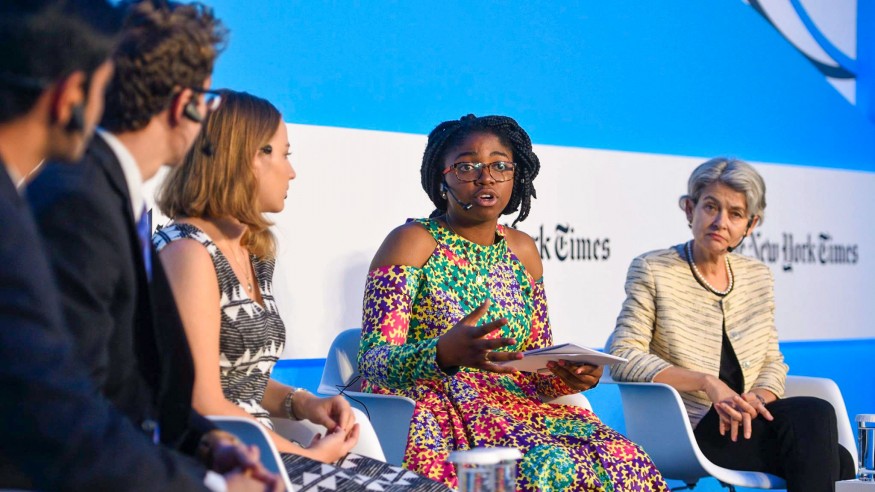
The New York Times Athens Democracy Forum
Ohio Wesleyan Student Steps on the International Stage at Athens, Greece, Event
Even as Ohio Wesleyan University sophomore Raissa Kanku sat on stage in Athens, Greece – one of four college students worldwide selected to participate in a panel discussion at a New York Times forum on global democracy – she kept asking herself, “How can I use this experience to help others?”
“Education is a privilege,” said Kanku of the Democratic Republic of Congo. “How do you keep the educational opportunities made available to some from creating a ‘survival-of-the-fittest’ environment that hurts others?
“This experience taught me that it is important to stay true to your values and be sure of what you stand for, fight for, and wish for,” said Kanku, a politics & government and French double-major and international studies minor.
Kanku was in Athens from Sept. 10-15 for the three-day New York Times Athens Democracy Forum, themed “Solutions for a Changing World.” Before the forum began, she participated in an additional three days of educational events facilitated by the American College of Greece and by the Global Liberal Arts Alliance of the Great Lakes Colleges Association (GLCA).
During the pre-conference, Kanku and 22 other college students nominated by their schools to attend the forum shared their thoughts on topics explored in groups over the summer.
Kanku’s group – including students from Pakistan, Saudi Arabia, Switzerland, and the United States – discussed how today’s youth are involved in issues of democracy and how they could become more involved.
Based on the strength of her presentation, Kanku was one of four students asked by organizers to take part in an on-stage panel discussion Sept 15 at the democracy forum. She joined students on the panel from Greece, Switzerland, and Kenyon College in Ohio.
The “Bridging the Generational Gap” panel also included Irina Bokova, director general of the United Nations Educational, Scientific and Cultural Organization (UNESCO); Kerry Kennedy, president of the Robert F. Kennedy Human Rights organization; and Brian Smith, president of The Coca-Cola Company’s Europe, Middle East and Africa Group.
Also during the forum, Kanku met ambassadors, prime ministers, and other leaders, including Costas Gavroglou, Greece’s education minister, and Amina Mohamed, Kenya’s minister for foreign affairs and international trade.
“It was intimidating to meet so many people so quickly, but I put myself out there,” said Kanku, who, after graduation, hopes to work with former child soldiers from the eastern part of the Democratic Republic of Congo.
She also said she was concerned about disagreeing with points of view expressed by some of the political and business leaders at the forum.
“That’s where my biggest fear was, but I learned that it’s OK to disagree with someone not of the same economic background as long as you disagree in an appropriate manner,” Kanku said. “It’s also important to know why you are disagreeing. As for me, I want to help build a better future.”
In addition to participating in the on-stage panel discussion, Kanku was tapped to moderate a small-group discussion tied to the United Nations’ goal of addressing climate change. Other students served as scribes for the breakout discussions, which also explored the UN’s global goal of reducing inequality within and among countries.
Although the forum is over, the students, who represented 12 countries overall, will continue working together to prepare short reports on the discussions and themes expressed during the event. Their reports will be published by The New York Times.
Simon Gray, Ph.D., program officer for the GLCA’s Global Liberal Arts Alliance, helped to facilitate the forum and preceding educational events.
“By any measure, this was a tremendous success for our students,” he said in a wrap-up letter shared with Ohio Wesleyan and other GLCA members. “They were outgoing, articulate, thoughtful, and poised.
“It was an absolute delight to see them interact with one another,” Gray stated. “It was remarked at the Forum that one challenge we face is isolating ourselves within communities with little or no interaction with others who have different life experiences and worldviews. Through their interactions, our students formed a different community, one that encourages sharing, curiosity, and empathy; a willingness to share across ‘community’ boundaries.
“It gives us reason to be optimistic about the future,” he concluded.
Learn more about The New York Times Athens Democracy Forum at www.athensdemocracyforum.com and more about the GLCA’s Global Liberal Arts Alliance at http://liberalartsalliance.org.
